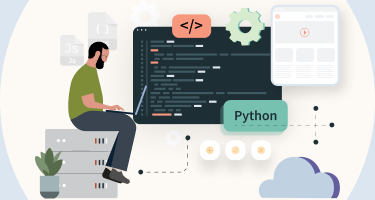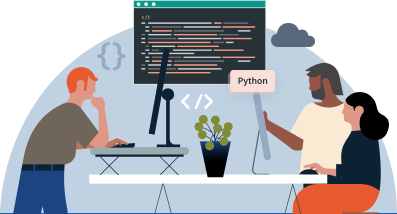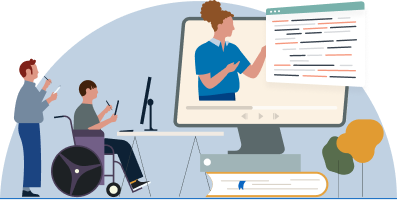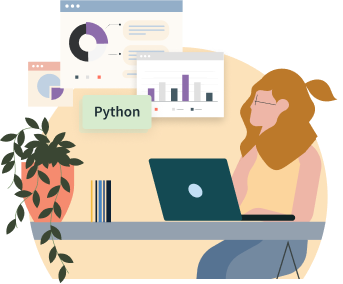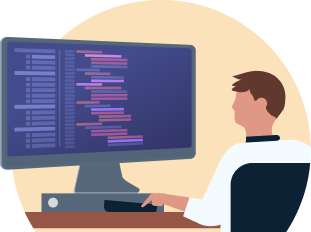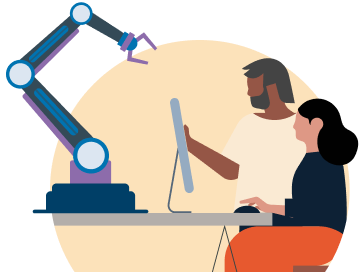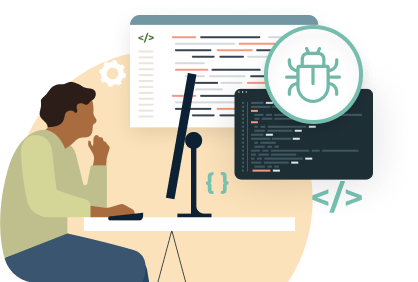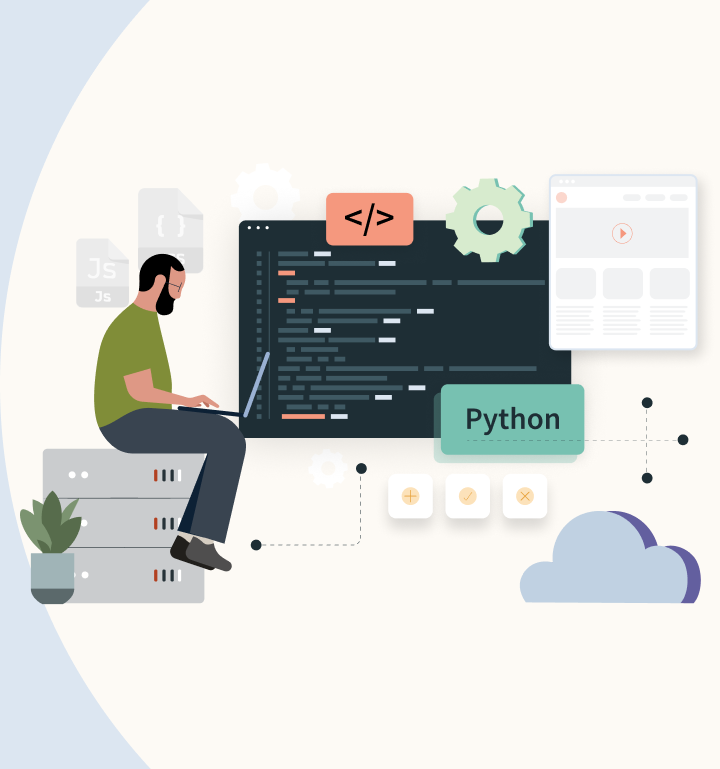
Python is a powerhouse in the programming world. From web development and data analysis to artificial intelligence and machine learning, Python's versatility makes it a go-to coding language.
Equipping your team with Python coding skills will enable them to craft innovative solutions and tackle complex projects with ease. Let’s review the fundamentals of Python programming and explore learning opportunities for your team.
1. Readable and maintainable code: Readable code improves collaboration and maintainability, allowing developers to work on projects more efficiently.
2. Support for multiple approaches to programming: This flexibility enables developers to choose the most suitable approach for their machine learning projects, accommodating different coding styles and preferences.
3. Compatibility with all major operating systems: Cross-platform compatibility ensures that machine learning projects written in Python can run seamlessly on various environments, making it convenient for developers and enabling deployment on different systems.
4. Robust standard library: This library provides a wealth of reusable code, making it easier to implement common functionalities in machine learning projects. Developers can leverage the standard library to save time and effort when coding.
5. Wide range of open-source frameworks and tools: Because they’re open-source, developers can leverage and contribute to a vast array of high-quality software solutions.
6. Development of complex software: Python enables developers to handle sophisticated tasks in artificial intelligence, natural language processing, computer vision, and more.
7. Test-driven development (TDD) support: The language's support for testing frameworks such as unittest and pytest enables developers to write tests and perform continuous testing throughout the development process.
Web Development: Frameworks like Django and Flask empower your team to build dynamic and scalable web applications efficiently. Python's simplicity and rich library ecosystem enable rapid development.
Data Analysis and Visualization: Your team can leverage Python tools to extract insights, make data-driven decisions, and communicate findings effectively.
Machine Learning and Artificial Intelligence (AI): Your team can create intelligent systems, develop predictive models, and implement cutting-edge algorithms.
Automation and Scripting: The simplicity and versatility of Python make it ideal for automating repetitive tasks and scripting. Your team can write scripts to automate workflows and perform system administration tasks.
Scientific Computing: Due to its ease of use, Python is widely used in scientific computing. Your team can leverage Python tools to solve complex mathematical problems, perform simulations, and conduct scientific experiments.
Internet of Things (IoT): Python's lightweight nature and support for IoT protocols make it a solid choice for developing IoT applications. Your team can use Python to program IoT devices, connect them to networks, and seamlessly process data from sensors.
Learning paths for coding in Python: Basic to advanced
Getting Started with Python
This path is suitable for both novice programmers and experienced coders aiming to enhance their skills. By following this path, you will acquire the fundamental abilities needed to write Python code.
Key objectives of this path include:
Creating and executing Python programs
Application development
Preparing for LinkedIn's Python Skill Assessment
This learning path is designed to help you progress from the basics of Python programming and prepare to become a Python developer.
Key objectives of this learning path include:
Learning industry-standard practices
Creating practical applications through hands-on practice
Applying knowledge to work as a Python programmer
Elevate your proficiency in Python programming and advance your career. This learning path explores the more intricate aspects of Python and guides you on applying these advanced skills to your own projects.
Key elements of this learning path include:
Mastering advanced Python programming techniques
Exploring Python with databases and data analytics
Practicing Python knowledge with code challenges
Whether you are an advanced programmer or have recently completed your initial Python course, this learning path offers guided challenges and projects to further enhance your expertise.
Key objectives of this learning path include:
Utilizing Python skills
Attempting guided challenges and projects
Gaining practical hands-on experience
Python learning paths for specific areas of focus
Do you want your team to develop specific skill sets within Python? These learning paths will help them specialize their Python skills so they align with your organization’s goals.
Master Python for Data Science
Python has become the dominant programming language in the field of data science and analytics, and mastering it can greatly increase your team’s ability to produce reliable insights for your organization.
Key objectives of this learning path include:
Practicing data access and analysis using Python
Understanding abstract data types
Improving efficiency and speed coding with Pandas
This learning path is designed to equip individuals with the skills necessary to become proficient in Django, a widely used Python web framework.
Key objectives of this learning path include:
Building dynamic apps with client-server data communication
Working with data through RESTful APIs
Deploying applications to the cloud
Advance Your Skills as a Machine Learning Specialist
This learning path covers the design and construction of machine learning algorithms, providing you with a comprehensive skill set in this rapidly growing and highly sought-after field. The initial four courses of this learning path focus on machine learning with Python.
Key objectives of this learning path include:
Designing machine learning algorithms
Building recommendation systems
Designing machine learning solutions for applications
Getting Started in Test Automation Engineering
This learning path introduces automation in software testing. It emphasizes the benefits of automation in accelerating software delivery, enhancing quality, and ensuring career relevance for testers.
Key objectives of this learning path include:
Discovering the fundamentals of test automation
Mastering Selenium testing tools and frameworks
Exploring Python for test automation tasks
External tools and resources for Python coding
When it comes to upskilling your team in Python coding, leveraging external tools and resources can significantly enhance their learning experience. Here are a few you should know about.
Code editors and integrated development environments (IDEs) play a crucial role in enabling efficient and productive coding. These tools provide features such as syntax highlighting, code completion, and debugging capabilities, which facilitate smoother development workflows.
Python libraries and frameworks are valuable resources for enhancing your team's coding capabilities. Libraries like NumPy, Pandas, and Matplotlib offer powerful functionalities for data manipulation, analysis, and visualization. Frameworks such as Django and Flask simplify web development, allowing your team to create robust and scalable Python-based applications with ease.
Online communities and forums dedicated to Python developers provide a wealth of knowledge-sharing and networking opportunities. These are excellent places to seek guidance, exchange ideas, and stay updated on the latest trends and best practices in Python coding.
Python coding skills open up various opportunities across a multitude of business functions. By investing in Python upskilling, you enable your team to leverage Python's simplicity, versatility, and extensive ecosystem.
Empower your team with access to these courses and hundreds more on the LinkedIn Learning platform. Request a demo today to see how we can help your team grow.
